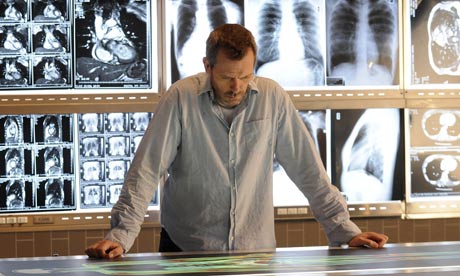
If Sherlock Holmes came back as a doctor, he might look like Dr Gregory House, the brilliant but flawed diagnostician in the medical drama, House. Pinpointing oddball conditions and rare afflictions with razor-sharp acuity after lesser doctors have tried and failed to come up with the right illness, House and his team have to cut through physiological red herrings and psychological obstruction to figure out what is ailing the hapless victim of the moment.
It is this perfect blend of two of the modern world's most deep-seated fascinations – the mystery story, and the gloriously varied dysfunctions of our own bodies – that has made House the most watched show on TV. And it's obvious the writers and producers are having as much fun as the audience, as they unearth such obscurities as porphyria (which makes your urine turn purple), Wilson's disease (in which the body reacts badly to copper) or patent ductus arteriosus, which causes the patient's lungs to collapse under stress.
Although the show is into its seventh series in the UK, it shows no sign of running out of material. Indeed, a lack of diseases to draw on has never been a problem according to the show's creator, David Shore. "There seem to be no limits to the ways the human body can break down." he says. Shore is a huge Holmes fan – House and his most trusted sidekick Wilson are a self-conscious homage to Holmes and Watson. And, according to Dr Lisa Sanders of the Yale School of Medicine, the show's most influential medical adviser, doctors are the natural heirs of the Holmes tradition. "If you know Sherlock Holmes," says Sanders, "you know he would have been a doctor if he could have been. The problem was, in those days, there was no way to make a definitive diagnosis, and even if there were you couldn't do anything about it. So he couldn't be a doctor."
Sanders has been fascinated for years by what she calls the "mystery story at the heart of the doctor-patient encounter" and writes an occasional column in the New York Times entitled Diagnosis, which mines much the same investigative territory as House, only without our hero's glaring character flaws and soap-opera relationships with his colleagues.
The drama has no set rules. Sometimes the writers will craft a story around a disease; at other times they will craft the story and then go to the – by now – formidable team of medical experts for a suitable disease to fit around it, says Shore. It's a process that can lead to lengthy negotiations to keep the medicine real and the drama intact. For well-needed light relief, a handful of knockabout medical problems are worked into the scenes that depict House's clinic work. This scenes often draw on the real-life experiences of the production team – a child who swallows a magnet (Shore's own nephew), for instance, and a boy who develops alarming red splotches on his body because he lies down naked on a bright red couch after taking a bath.
Medical accuracy, however, is of paramount importance: House enjoys a vast worldwide audience, and nobody on the production team wants to risk viewers diagnosing themselves with ailments that don't exist, or dabbling in self-administered treatments inspired by the show that might cause them further damage.
Every now and again, the diagnostic outcome is both delicious and surprising – such as the time a CIA agent was convinced he was being poisoned, only to be told at the end he was chomping down too many Brazil nuts. Shore himself particularly enjoyed discovering that there was a kind of brain tumor that causes the patient to lie all the time. That syndrome tied beautifully into one of House's favourite sayings: "Everybody lies." And it also gets to the heart of what makes the show tick. "Really," says Shore, "it's about what the patient is hiding, what their secrets are, why they are lying."
For Sanders, the show is a vindication of the notion that diagnosis itself is a process that exposes everyone's vulnerabilities, strengths and weaknesses – not in all cases, certainly, but in the ones that are really interesting. "If you look at diagnosis before House," she says, "it's a one-liner: 'Sorry, you have leukaemia.' You saw Love Story. But to me that one-liner was just the tip of a fascinating iceberg."
The show is very much in the classic tradition of mysteries, she says: "You have the clues, the red herrings, the incompetent boobs who get it wrong, and you have a doctor who is able to put it together exactly right." That explains why the show is much more than a dive into the more obscure pages of the medical encyclopedia. When Shore set up the show, he was insistent that the diseases be a vehicle for a broader drama full of psychological twists and ethical dilemmas. After all, as he puts it: "Germs don't have motives."
House revels in cases of the unobvious, which also means exploding the myth of hospital consultants as all-knowing demigods of their own universe. "What House shows," Sanders says, "is that on the way to being right, we're often wrong. And that is something doctors have never been able to talk about." The point, though, is not to show up incompetence. "Incompetence isn't interesting. What's interesting is when really smart doctors get things wrong."
House: season six is available now on Blu-ray and DVD. Season seven is now showing on Sky1 and season two on Channel Five.

